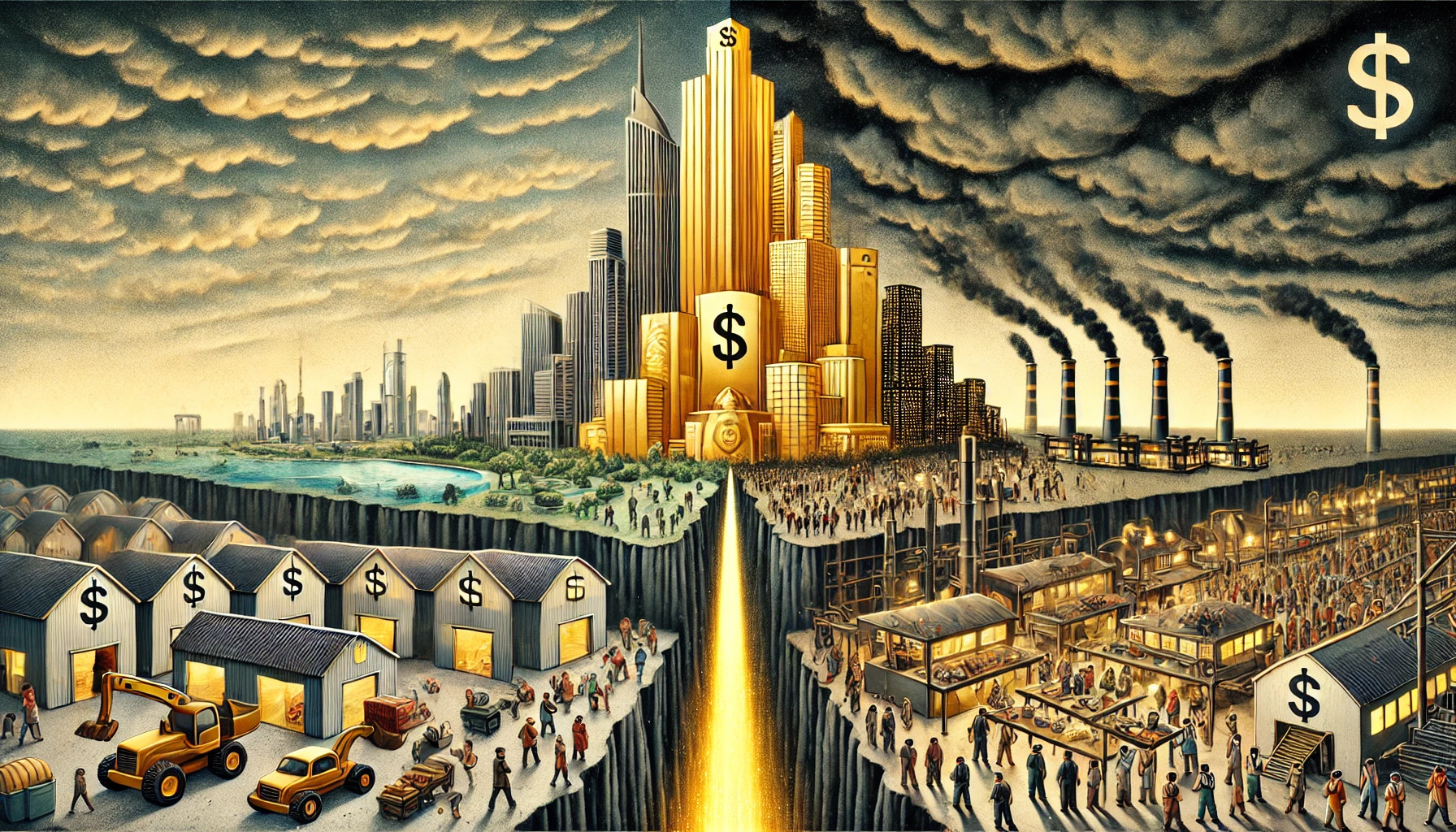The world is increasingly defined by staggering economic inequality in which billionaires occupy a paradoxical position: revered as heroes of innovation while often escaping scrutiny for the exploitation and systemic inequities that underpin their wealth. Figures like Elon Musk, Jeff Bezos, and Mark Zuckerberg, much like their Gilded Age predecessors Andrew Carnegie and John D. Rockefeller, are idolized for their transformative achievements. Yet, these towering fortunes are rarely examined through the lens of the questionable practices, unethical tactics, and systemic flaws that made them possible.
A recent Oxfam report highlights the alarming concentration of wealth, revealing that the top 1% amassed over $40 trillion in new wealth in the past decade. This disproportionate gain, enabled by tax systems and policies favoring the ultra-rich, mirrors a pattern established during the Industrial Revolution. Just as the Gilded Age’s “robber barons” extracted immense value from the labor and resources of society, today’s billionaires leverage technological monopolies, tax avoidance, and worker exploitation to consolidate their fortunes. No one “earns” a billion dollars in isolation—such wealth is extracted, not created.
The Allure of the Billionaire Narrative
The myth of the self-made billionaire is a potent narrative in popular culture. It celebrates individual brilliance, grit, and hard work, perpetuating the idea that immense wealth is the ultimate reward for those who dare to dream big. Henry Ford is remembered for revolutionizing manufacturing with the assembly line, Elon Musk for electrifying the auto industry with Tesla, and Jeff Bezos for transforming global commerce with Amazon.
But this narrative omits a crucial element: the cost of these achievements. Workers in Amazon warehouses, for example, endure grueling conditions, while Musk’s Tesla factories have faced allegations of unsafe work environments. These stories rarely make headlines compared to tales of space exploration or electric cars. The media’s fixation on billionaire successes blinds us to the exploitation and systemic inequalities that make these fortunes possible.
The Achievements and Their Cost
There is no denying that many billionaires have left indelible marks on society. Carnegie’s steel empire built America’s bridges and railroads. Ford’s affordable Model T democratized transportation. Musk’s SpaceX has reignited global interest in space exploration. These achievements have reshaped industries and transformed lives.
However, these accomplishments came at a steep price. Carnegie’s success relied on suppressing labor rights, with incidents like the Homestead Strike highlighting the violence faced by workers demanding fair conditions. Ford’s celebrated $5-a-day wage was coupled with invasive surveillance of employees’ private lives. In the modern era, Amazon’s logistical innovations rest on the backs of workers subjected to intense productivity demands, while tech giants like Meta profit from invasive data collection and misinformation.
Exploitation and Unethical Practices
Billionaires often achieve their wealth through practices that would be unacceptable in most contexts:
- Monopolistic Domination: Rockefeller’s Standard Oil crushed competitors to create a near-total monopoly, while today’s Big Tech empires use acquisitions and market control to stifle innovation.
- Labor Exploitation: Workers across industries, from Tesla’s factory floors to Walmart’s retail operations, often face low wages, unsafe conditions, and minimal job security.
- Shady Tactics: Whether it was Gould’s stock manipulation in the Gilded Age or modern tax avoidance schemes exploited by billionaires today, questionable ethics have been a consistent tool for amassing wealth.
As the Oxfam report illustrates, the systemic advantages enjoyed by the ultra-wealthy—such as favorable tax systems—further exacerbate inequality. While ordinary people pay a larger share of their income in taxes, billionaires utilize loopholes to shield their wealth, accumulating resources that could otherwise benefit society.
Philanthropy: A Paradox
Philanthropy is often touted as a defense for immense wealth. Carnegie built libraries, Gates combats global health crises, and Bezos has pledged billions to climate initiatives. While these efforts are impactful, they represent a fraction of their wealth and often serve to rehabilitate reputations tarnished by exploitative practices.
It is a “smoke and mirrors” distraction meant to sway public perception, but does little to address systemic inequality. It offers a band-aid solution to problems created, in part, by the systems that enabled billionaires’ fortunes. For example, Gates’ contributions to global health are admirable, but Microsoft’s aggressive business practices in the 1990s crushed smaller competitors and concentrated wealth.
The Role of Systemic Advantages
Billionaires do not operate in a vacuum; their success is built on a foundation of societal resources and systemic privilege:
- Government Subsidies: Many industries, from fossil fuels to tech, benefit from taxpayer-funded subsidies and incentives.
- Tax Avoidance: The Oxfam report underscores how billionaires exploit tax loopholes, hoarding wealth that could be used for public services.
- Infrastructural Dependence: Publicly funded infrastructure, such as roads, education, and internet technologies, provides the groundwork for their enterprises.
Without these systemic advantages, their wealth would be inconceivable.
Insane Compensation Disparity
The inequity in wealth distribution is stark not only among billionaires but also within individual corporations, where CEOs often earn magnitudes more than their average employees. In 2023, the average CEO of an S&P 500 company earned $17.7 million, which is 268 times the compensation of the typical worker in those companies.
This disparity is not necessarily reflective of a proportional difference in effort or contribution. Actually, that is too mild. I’m not suggesting that CEOs or other execs don’t bring value to their companies, but this disparity is DEFINITELY not reflective of a proportional difference in effort or contribution.
The Economic Policy Institute reports that CEO compensation has grown 1,460% since 1978, while typical worker compensation has increased by just 18% during the same period.
This growing gap underscores a systemic issue where executive pay is disproportionately high compared to the value provided by average employees.
Such disparities are indefensible, as they often result from structural advantages and compensation practices that favor top executives, rather than a fair assessment of individual contributions. Addressing this imbalance requires a critical examination of corporate governance and the implementation of policies that promote equitable compensation structures.
Reframing Wealth
It is time to rethink how we view billionaires and their role in society. No individual amasses such wealth through merit alone—it is accumulated through systemic exploitation and societal structures. Recognizing this truth allows us to shift the narrative from glorifying billionaires to questioning the systems that enable such extreme inequality.
Instead of idolizing the ultra-rich, we should celebrate collective achievements and advocate for policies that redistribute wealth more equitably. Progressive taxation, living wages, and labor protections are steps toward creating a fairer society. Moreover, reframing success as a collaborative, community-driven effort can help dismantle the myth of the self-made billionaire.
By challenging the myth of “earning” a billion dollars, we can begin building a more equitable society—one where success is measured not by individual wealth but by collective progress.


